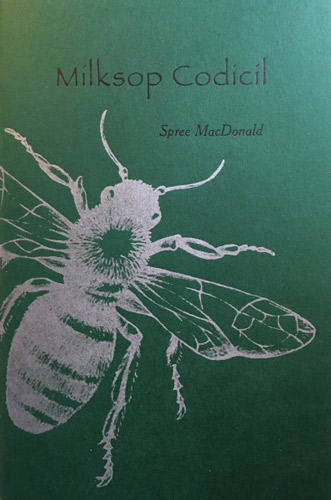Milksop Codicil
Spree MacDonald writes without punctuation in Milksop Codicil, conscious of the placement of the words, lines, and stanzas on each page and how they interact with space to produce meaning. The effect is attention to images and how they interact independent of grammatical constraint.
Spree MacDonald writes without punctuation in Milksop Codicil, conscious of the placement of the words, lines, and stanzas on each page and how they interact with space to produce meaning. The effect is attention to images and how they interact independent of grammatical constraint. Reading lines such as the following yields understanding through placement on the page:
so we settle on this
sacred swamp
the newest land
the weakest land
this brackish backfill clot
and hemorrhage into
open water
This stanza from “On the Third Distribution of Whites” needs no regulation to indicate meaning. Punctuation would be superfluous. The poems throughout the collection are similar in this attention to language and moments of thought.
MacDonald’s poems contain layers of meaning infused with complex images and cultural, historical, and literary allusions. The notes at the end of the collection are helpful in making the connections his poems present. Understanding the references and linguistic relationships makes for a meaningful partnership between poetic personae and readers. Understanding who “Olamina and her Earthseed survivors” are enriches the reading experience.
The opening poem, “Divination,” presents images both modern and mythic in tone and relevance. Each stanza reveals another piece of an enigmatic scene, the first lines acclaiming:
tonight I stumble through the jungle
lot to the sacrifice
zone between my modernist
murder nest and the astringent abyss
The complex alliterative images continue throughout the poem as the speaker refers to the “synaptic snap,” the “creosote cured and pitch-patched / burst,” and the “conceal and carry evening.” These images alone add to the narrative in which the speaker seems to be searching for something to believe in and creating a belief system for himself.
Beliefs are important in MacDonald’s poems and seem to anchor the speaker in each to something larger than the self. Creating setting in “Colony Collapse Syndrome” with “in this labor hood of Atlantis” has an aquatic feel that follows a reference to a slum and includes a play on the word neighborhood. Allusions to Atlantis appear in a number of poems in the collection, making repeated references important enough to study further.
Other important and repeated references are those to Anikulapo, a Nigerian political figure we’re told in the end notes. His presence in the poems is significant but not always apparent. It is important also to note that Anikulapo was the originator of Afro-Beat music. MacDonald’s poems are rhythmic and musical, and he skillfully produces sound, cadence, and meaning with powerful words and figurative language. In the last poem of the book, “Scrap Atlantic,” which is adapted from a number of sources, the first line is potent: “language is the only homeland.”
The poems in MacDonald’s chapbook use language in a way that makes that opening line in the last poem the truest thought ever written. Revisiting the poems in Milksop Codicil will continue to unveil the truth, layer by meaningful layer.





